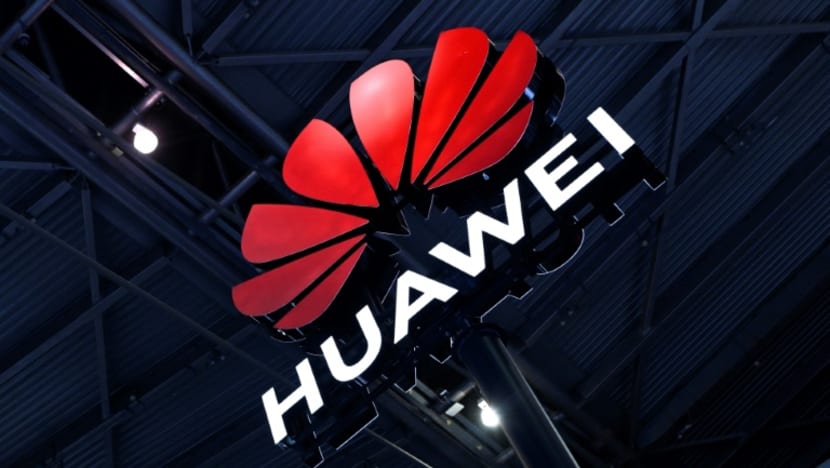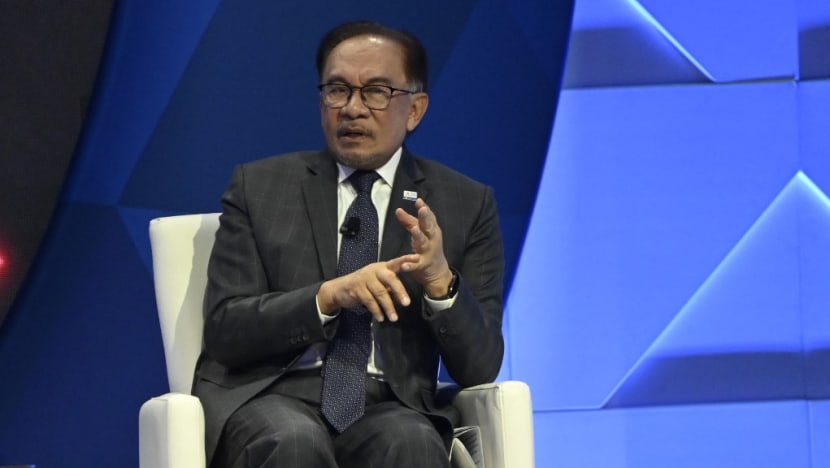exclusive Asia
Malaysia’s telcos set to agree ‘compromise’ deal with govt, ending face-off over a second 5G operator
The deal could be signed in coming days, and pave the way for China’s Huawei to emerge as a technology competitor to the Ericsson-powered state-owned monopoly Digital Nasional Bhd (DNB).


This audio is generated by an AI tool.
KUALA LUMPUR: Prime Minister Anwar Ibrahim’s administration and Malaysia’s mobile network operators are putting the finishing touches to a highly complex deal that would pave the way for a second operator in the country’s plan to roll out its superfast fifth-generation wireless network, or 5G.
The agreement that could be signed as early as Friday (Dec 1), barring any hiccups, will resolve one of the most protracted faceoffs between government and private business in Malaysia over a major economic initiative, stemming from the country’s unsettled politics in recent years.
The compromise plan will involve several stages before a second network is set up to operate alongside state-owned Digital Nasional Bhd (DNB), which will also be taken over eventually by the private sector, according to industry executives close to the situation who spoke on condition of anonymity.
In a nutshell, the architects of the plan are hoping that the country’s private mobile network operators (MNOs) would come together to form two separate consortiums: one taking over ownership of DNB and the other rolling out a separate network that could see a new technology partner, with possibly China’s Huawei emerging as a player in the country’s 5G rollout.
Communications and Digital Minister Fahmi Fadzli told reporters this week a few details needed to be ironed out and that an agreement to resolve the 5G conundrum would be inked “very, very soon”. He did not elaborate on the timing.
“At this point, things are moving well and we are still looking at a Dec 1 signing,” said one senior industry executive closely involved in the negotiations for the establishment of a second network.
Related:
Still, Malaysia is not out of the woods in the 5G roll-out that could cost more than RM16.5 billion (US$3.55 billion).
The compromise plan to the single-most expensive economic initiative inherited by the Anwar administration must overcome numerous hurdles in the coming weeks and months, say industry executives.
They add that compromises by both the government and the private telecommunications companies will be required.
MULTI-TIERED PLAN
The proposed establishment of a second 5G operator will feature several milestones.
In the first stage of the proposed plan, Malaysia’s five operators will pay roughly RM350 million each to DNB, which remains in the midst of rolling out the 5G network.
The collective fund-raising of RM1.75 billion would be treated as a pre-payment to DNB for access to its 5G network for the next two to three years.
Under the second stage of the multi-tiered plan, the five MNOs – Maxis, the country’s most dominant players, the recently merged CelcomDigi, U Mobile, which is part owned by Singapore’s Straits Mobile Investment Pte Ltd, YTL Communications and Telekom Malaysia – will conduct a due diligence into the operations of DNB.
Industry executives close to the compromise plan noted that the due diligence process is expected to take about six weeks.
The executives noted that the due diligence process will allow telco operators to have visibility of the cost structure of the state-owned company and its debt exposure.
It will also offer the opportunity to scrutinise the confidential contract that DNB had entered into with Ericsson to develop the 5G infrastructure before the MNOs decide whether to participate in the takeover of DNB or be part of a consortium that will take on the roll-out of a new network.
Under the compromise plan, the anchor party that secures rights to roll out a new network will only be allowed to begin laying out the new infrastructure after DNB’s coverage reaches 80 per cent of the national populated area, up from 73 per cent currently.
Doing so would give DNB, which has already committed a considerable amount of capital into rolling out its network, an opportunity to recoup its investment by leasing access to telcos ahead of the second operator.

MESSY POLITICS
The move to allow the country’s mobile network operators to carry out a due diligence on DNB represents a crucial element in the compromise plan and is aimed at resolving the long-standing reservations with Malaysia’s original decision to roll out its national 5G network.
Industry executives noted that the country’s telco regulators will only be able to pin down new timelines on the rollout for the 5G ecosystem after the two anchor parties are determined.
The 5G plan has been mired in the country’s messy politics following the historic loss of the long-established Barisan Nasional coalition to the opposition Pakatan Harapan (PH) in the May 2018 general election.
The new PH government had originally planned to award the 5G spectrum through a bidding process that would require the country’s telcos coming together in separate consortiums to participate in the tender.
But that plan was shelved after PH lost power in late February 2020 due to defections from its own camp in a political coup staged by former premier Muhyiddin Yassin, who led breakaway factions to form a new government with parties from the BN coalition.
The Muhyiddin administration dumped plans to give the country's telco players a direct role in the 5G rollout. And in March 2021, the government stunned the industry when it declared that ownership of the country’s 5G spectrum would be vested with the newly incorporated DNB that would offer wholesale access to all licensed telecom operators on an equal basis.
But the proposal to create a so-called single wholesale network at the estimated cost of close to RM16 billion quickly came under fire by the powerful telco lobby and opposition politicians, who argued that the ambitious economic plan was never subjected to any public scrutiny.
The proposal to establish DNB was announced just weeks after the Muhyiddin government declared a state of emergency over the Covid-19 pandemic that led to the suspension of parliamentary sittings and debates.
Malaysia’s top three telecom companies are controlled by several of the country’s prominent business tycoons, together with state-controlled entities, such as Khazanah Nasional Bhd, the Employees Provident Fund, and Permodalan Nasional Bhd.
Maxis, the country’s most dominant player, is controlled by businessman T. Ananda Krishnan, who is a long-time associate of former premier Dr Mahathir Mohamad.
DIGI, which is majority owned by Norway’s Telenor ASA, recently completed a merger with state-controlled Celcom to form CelcomDigi.
U Mobile is the country’s fourth largest operator and apart from Singapore’s Straits Mobile Investments Pte Ltd, its other major shareholder is Malaysian businessman Vincent Tan Chee Yioun, another Mahathir business acolyte.
The Muhyiddin government ignored the pushback from the private telecom operators and went ahead to appoint international telecom giant Ericsson to roll out the country’s 5G infrastructure.
It was a move that further infuriated several industry players, which had already established long-term relationships with other technology providers, such as China’s Huawei.
STICKY OPTIONS
Mr Anwar, who had campaigned as opposition leader against the establishment of a single wholesale network, quickly registered after taking over as premier last year that he was open to dismantling DNB’s monopoly over the 5G space because countries that adopted the monopoly network faced a number of problems.
GSMA, a global organisation often referred to as the mobile industry’s own think-tank, has weighed in on the Malaysian 5G debate in the past and noted that countries that opted for the single network model have seen the 5G sector beset by rollout delays and low mobile broadband penetration.
Among them are countries such as Belarus and Rwanda, where the state-controlled entities allocated the 5g spectrum have been saddled with huge losses.
But for Malaysia, finding a compromise plan proved difficult because the options that were being considered proved sticky.
Both sides also mulled over a plan to disband the DNB 5G company and carry out an fresh auction process of the spectrum, a move that would have potentially created a crowded field.
Another proposal was the outright sale of DNB to local telco players and foreign investors, with the state retaining a golden share to give it veto rights over the company.
But the negotiations stumbled because of pricing issues and the failure on both sides to reach an agreement on management control of the state-owned monopoly after an equity restructuring exercise.
Proponents of the DNB plan have also long cited security concerns of embracing Huawei, which has seen its technological products banned in several western countries over concerns that the Chinese government could exploit security gaps to spy on foreign governments.
But the current government sees China as a vital economic and technological partner.
Many industry executives noted that amid all the wrangling, Mr Anwar had ordered all parties two months ago to work out a compromise plan that would pave the way for the establishment of a second operator in the 5G space.
NEXT PHASE CRUCIAL
Now that the Anwar government has convinced the telco players and DNB to find common ground, the next critical phase would be how industry players form partnerships that will either opt for taking over the current state-owned monopoly or choosing to be involved in setting up a new network.
As it currently stands, industry executives noted that the government would prefer for the newly merged CelcomDigi to lead the consortium that will pursue the takeover of DNB, while allowing Maxis, the most dominant mobile operator, to team up with U Mobile and proceed with the establishment of a new network.
Maxis and U Mobile are already major technology customers of China’s Huawei and their existing network could be upgraded to meet 5G specifications at a lower cost.
“This phase of the deal is going to be crucial because telcos would naturally prefer to be in the consortium rolling out a new system, which means the government will have to find a way to make taking over DNB an attractive proposition,” said a director of a Malaysian telco company, who has been briefed about developments in the compromise plan and prefers not to be named.













